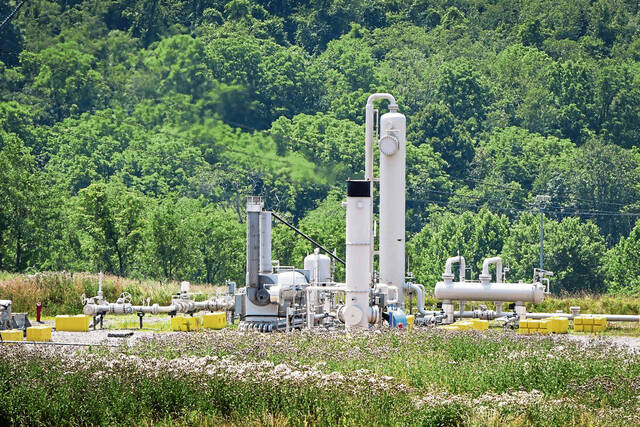Pittsburgh-based natural gas producer EQT Corp. has acquired local competitor Olympus Energy for $1.8 billion.
The deal, which officially closed last week, consolidates EQT’s control over regional natural gas deposits at a time of rising demand.
“This strategic transaction strengthens our position as the leading natural gas producer in the United States and enhances our footprint in our core operating area in Appalachia,” said EQT’s spokeswoman, Amy Rogers.
Olympus is headquartered in Canonsburg, Washington County, but most of its 100,000-plus acres of drilling and fracking footprint are located in Allegheny and Westmoreland counties. In Pennsylvania, EQT primarily operates in Greene, Fayette and Washington counties, but also has a substantial presence in eastern Ohio and northern West Virginia.
Rogers declined say how many employees Olympus has or if they’d be retained.
Olympus did not return requests for comment.
Andrew Dittmar, principal analyst at energy research firm Enverus, described the deal as an “obvious strategic fit” given the companies’ adjacent acreage and the possibility for efficiencies in storing and transporting gas.
The natural gas industry has consolidated in recent years as companies try to strengthen their market position and capitalize on surging demand.
Data centers, in particular, promise to soak up plenty of gas-generated electricity in the coming years.
These facilities house computing equipment that store things like text messages or internet searches. In 2023, they accounted for more than 4% of electricity use in the U.S., according to the Department of Energy, a figure that’s only expected to grow with the rise of the power-hungry artificial intelligence industry.
Data centers are in development at the former Alcoa research center in Upper Burrell and the old Homer City Generating Station in Indiana County, which is also being turned into the nation’s largest gas-fueled power plant.
The Homer City plant could use up to 750 million cubic feet of gas a day, which is about 10% to 15% of EQT’s daily production.
One of the benefits of data centers, according to Dittmar, is the ability to build them close to natural gas extraction sites, avoiding the logjam in the pipelines that run through Southwestern Pennsylvania.
Favorable regulatory framework
A soft regulatory environment has also paved the way for good times in the natural gas business.
President Donald Trump has vowed to aggressively expand domestic production, even as natural gas prices remain relatively low. There’s not much he can do besides make the permitting process more predictable and efficient, according to Jim Welty, president of the Marcellus Shale Coalition, but the rhetoric doesn’t hurt.
“When you hear the president embrace natural gas and oil production, investors hear that and are bullish on the opportunities that it presents,” Welty said.
Pennsylvania Gov. Josh Shapiro, while hardly as gung ho about fossil fuel development, has embraced an “all of the above” approach to energy policy that does little to dissuade further natural gas production in a state that already ranks second for it.
The sale has caused alarm at Protect PT, an environmental organization in Westmoreland County focusing on the negative impacts of fossil fuel extraction.
“We see this kind of consolidation just as a way to facilitate additional drilling,” said James Cirilano, the organization’s community advocate. “It’s a setback for our purposes.”
EQT’s share price finished Tuesday around $55, down for the day but up from $49 on April 22, when the company first announced a sale was pending.
Jack Troy is a TribLive reporter covering business and health care. A Pittsburgh native, he joined the Trib in January 2024 after graduating from the University of Pittsburgh. He can be reached at jtroy@triblive.com.
